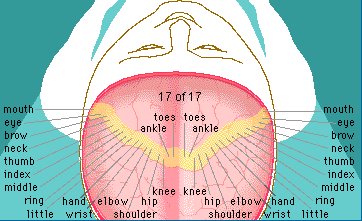The amygdala, hypothalamus, thalmus, medial temporal cortex, (including the hippocampus and adjacent structures) prefontal cortex and cingulate are also important in fear/ emotional responses and in the laying down of memory traces. This circuit of brain areas is described as the limbic brain. This was discovered because of lesions found in these areas causing loss of emotion.
As well as emotion, the limbic brain is important in the area of memory and smell, which are also important in the flight or fight response.
Any lesion to the hippocampus (from trauma) results in loss of memory for up to a month. Therefore, it is important to intervene immediately to assist victims of trauma before trauma is recorded in the long-term storage area called the cerebral cortex (the outside covering of the brain).
Case Study: In a study conducted by Bremner and his research team, it was shown that atrophy and dysfunction of the hippocampus in PTSD leads to distortions and fragmentation of memories e.g. a girl who was constantly locked in a closet, remembered the smell of old clothes but had no visual memory of being in the closet. With the help of psychotherapy and medication, she was able to integrate other aspects of the event into her memory.
Whenever the neurotransmitters are stimulated, the symptoms of PTSD increase. These include: flashbacks, hypervigilance, excessive arousal and increased startle response. (Southwick, S.M. and others,1997). This is also the underlying cause of lack of concentration, being fearful (when there is really nothing to worry about), panic attacks and sleep disturbance. This response also explains why so many PTSD victims use heroin, alcohol etc. to decrease the activity of chemicals in the brain. Southwick’s research showed that as the symptoms of PTSD increased, so did the use of addictions.
http://www.asca.org.au/childabuse/ca_traumaaffectsbrain.html
Sunday, July 15, 2007
Subscribe to:
Post Comments (Atom)

http://www.windyweb.com/stop.htm














No comments:
Post a Comment